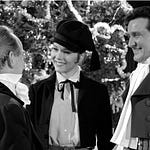It’s 1987, and a heartbroken Sam Malone (Ted Danson) has sold his beloved bar Cheers to the massive Lillian corporation — originally called Drox Chemical, Die, and Munitions with the unlikely motto “We care about people.”
Sam’s new boss is businesswoman Rebecca Howe (Kirstie Alley), and for the next three years, this faceless corporation where nobody knows anyone’s name would provide a new source of humor that was both topical but also eerily prescient. Sam even faces off against Donald Trump-inspired foil Robin Colcord (Roger Rees) who he defeats and helps send to prison. (We can only dare to dream.)
I had the chance to chat with Ryan Daly, host of the wonderful Cheers Cast — the podcast where everyone knows your name. We had a fun conversation about the Cheers “corporate era” and how it still has a lot to say about corporate America.
Edited excerpts from our discussion:
SER: I discovered your podcast during the pandemic. Cheers was COVID comfort for me. I was revisiting the series again, kind of checking in with old friends, and I found of your podcast. I’ve kept up with it since then. Now you are up to a period that is one of my favorites, specifically because I have very clear memories of watching it live as a kid with my now-late mother. When Kirstie Alley joined the show in season six, I was finishing middle school.
The [first Kirstie Alley] years very much feels like this “corporate Cheers” era. If we think about Sam Malone having sold the bar to this kind of faceless corporation, his boss is now this businesswoman, Rebecca Howe. What are your thoughts on this era of the show?
RYAN: Well, it’s my favorite, too. That’s why I was I was really thrilled when you asked me to talk about this, because I’m a few years younger, but also this was really the time where I got into the show, too … where it kind of became appointment television for me and my family was the start of season six.
I was aware of the Diane [Shelley Long] character and the era before her, but I was really just catching those episodes in syndication as they were airing along with the Rebecca years contemporaneously.
By the time they get to season eight, which is the climax of this sort of corporate era, the Robin Colcord [Roger Rees] season, this is when the show became my favorite show of all time, a distinction that it has held for 35 years.
[This era] is kind of eerily timeless, even though it feels so of a piece with the way we think about the corporate nature of the 1980s.
We think about the faceless, soulless corporations and kind of a renewed sense of populism today in society, and the villainization of billionaires to the point where some people are shooting them in the street.
They needed to do something when Diane left because they couldn't just try to do the same type of character, the same type of romantic foil for Sam. So they went in a different direction. And they create not just Rebecca as a love interest, but in the beginning a little bit as an antagonist. She was also the face of the faceless company as the antagonist for the bar.
Even though Sam sold it, [it plays out] as if they stole the bar from it and he’s got to try and get it back. Cheers is that place where everybody knows your name it is that comforting place, that retreat.
It’s a job sitcom rather than a family sitcom. It’s a workplace comedy but our nuclear family is all represented there and you contrast that with this idea of the corporation where everything is about greed and and, you know, self fulfillment and egotism and stuff like that.
It’s a wonderful kind of contrast that was just in the background for background for a couple of years until we really we get to the Robin character. This kind of brings it all to the fore.
SER: Rebecca [is] this working woman trying to thrive in what is somewhat of a dead-end situation. She’s sort of constantly either in over her head or being mistreated, which I think definitely resonates in a post-#MeToo environment.
How do you think the show handled that or satirized the struggles she might’ve been having?
RYAN: You can definitely make the argument on any given episode is Rebecca mistreated by her company because of systemic sexism and misogyny within the company and just ignorance on their part? … Or is she actually incompetent?
For the sake of humor, it’s a little bit of both and definitely more of her neuroses. That’s really kind of what gets in the way and hurts her.
We see sometimes she has some good business instincts and sometimes she doesn’t so much. They have to kind of thread the needle. The way she’s treated by the company is not great, but there’s also evidence to be seen that she really didn't deserve to climb the corporate ladder much more than she actually does.
Download the full podcast above. Don’t forget to like, share, and subscribe. Also, check out Cheers Cast on iTunes.












